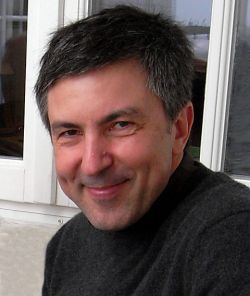Keywords / Tags
Won Childhood - Puberty - Cultural Revolution
The Foundation of Our Brain Development, Health and Personality
- Prof. Dr. Gunther Moll
(Friedrich-Alexander University Erlangen-Nuremburg) - 06.11.2010, 15.00
- Staedtische Buehnen Muenster, Theatertreff
- Free Entry
Humans don't fall from the sky fully formed. We also don't develop by following a pre-assigned programme. The period between pregnancy and childhood is decisive in our development and thus for the formation of health as well as the growth of our personalities. Most notably the experiences of the first six years of life form the network of nerve cells in our brains in individual ways and thus establish who and how we will later be.
Around two million years ago our brains created puberty by delaying our entry into sexual maturity by up to six years and with it the 'business of reproduction'.
The 12- or 13-year phase of the close relationship with one's parents is followed by the entry into puberty - with a dramatic emotional disconnection and disorientation. It was once the dawning of social responsibility, closely connected to a transfer of generations. When the child turned into an adult, their 30-year-old parents were already old and infirm; they gave up their power (not necessarily willingly) and died. The young took hold of the reins. Therefore as a matter of course they had to make use of a massive supply of courage and decisiveness. They had to be ready to take risks, be stubborn, curious and sometimes even hot-headed and aggressive.
And what about today? Today they are seen as being small by adults, described as immature, 'imprisoned' in full-time education, shut off from society and decision-making processes, their 'deviant' behaviour classified as a 'social behaviour disorder'. They have become the problem and the focus of welfare and education. At what cost to their loss of vitality, energy, strong-mindedness, creativity, innovation - and at what threat to their life and the future of our society.
Gunther Moll:
Gunther Moll is a neuroscientist, professor of child and youth psychiatry and psychotherapy, and campaigner in the field of children and health. He runs the Children and Youth Department for Psychological Health at the University Clinic Erlangen, with a particular focus on the optimal developmental conditions for children, the living conditions of families, the prospects of a multi-generational society and the development of psychological health. In particular he fights against the side-lining of children and senior citizen in 'custodial establishments' such as schools and old-people's homes.
Books:
- Hallo, hier spricht mein Gehirn [Hello, this is my brain speaking] (2006)
- Endlich in der Pubertaet [Finally Hitting Puberty] (2008)
- Die zehn groeßten Erziehungsirrtuemer [The Ten Biggest Educational Mistakes] (2010)
For this article we can offer you the following links:
The following tags are attributed to this article:


©2026 Kulturamt der Stadt Münster